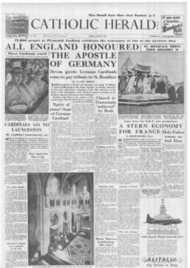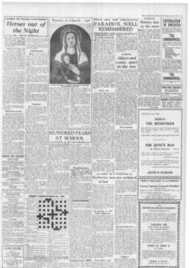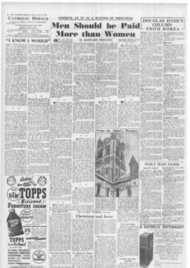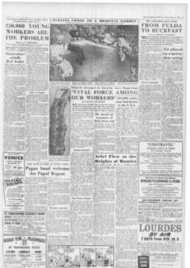Page 6, 25th June 1954
Page 6

Report an error
Noticed an error on this page?If you've noticed an error in this article please click here to report it.
Tags
Share
Related articles
Counter Culture Leonie Caldecott
Pilate's Letter `may Be True'
If Father Mathew Lived Today- W Uld He Give The Pledge...
Prelude To Victory
Longs
DISASTROUS PRELUDE
By Fr. Oswald Bennett, C.F.
Two fine films have recently been shown contrasting the darkness of Pagan Rome with the dawn of Christianity. Tiberius, in whose reign Our Divine Lord was crucified, and the mad Emperor Caligula both figure in "The Robe"; and in "Quo Vadis?" Nero, under whom the Chri,stians suffered their first savage persecution, stands out as the embodiment of all that was most vile in Imperial Rome. In the dreadful darkness of his reign every imaginable evil was unloosed; but the first glimmer of a new dawn also levealed itself in the fiery trial of the Roman Church and the martyrdoms of the two great Apostles of Christ.
Peter and Paul.
It is now nineteen hundred years since Nero, in A.D 54 through the murder of the reigning Claudius, became Emperor at the age of 17. Had he followed the advice of his tutor, the philosopher Seneca, all might have been well, but he soon yielded to the corrupt influence of councillors, such as Otho and Tigellinus, who for their own purposes urged him on to commit one crime after another.
He murdered his mother Agrippina, his step-brother Brittanicus, who had a prior claim to the throne, both his wives, Octavia and Popprea, his tutor Seneca, the poet Lucan, of
whom he was intensely jealous, the cultured Petronius, and many others too numerous to mention. The whole
of the 16th book of the "Annals" of Tacitus is one long narration of continuous murder, until the historian breaks off in apology for recording such horrors and concludes by stating that the Emperor endeavoured to exterminate virtue itself.
'Rabble of gods 'l/AS the Rome of Nero much VI' better than its Emperor? Each crime became the occasion for an outburst of fulsome adulation on the part of the degraded Senate, which, in order to ensure its own safety, gratefully offered votive gifts and sacrifices to the temples of the gods. What of these same gods? "If anyone pays credence to the supposed deeds of our rabble of gods," openly declared a barrister in a Roman trial, "they would have patrons and examples of every lust and crime." "Why should I fear the gods," Nero is reported to have said after one of his crimes, "when I can make them myself?" Which he did. And when he had deified his murdered mother and his wife Octavia and erected temples in their honour, it was to him an ample reparation. Such was the foulness of this evil Paganism, poisoning the world with its dying breath before its corpse was swept aside by Christianity. It was time indeed for this spiritual and moral darkness to yield to the glowing dawn of the reign of Christ.
First warning PXACTLY when the glad tidings '-'of the Gospel of the Risen Christ, with its glorious teaching of the Fatherhood of God, the Incarnation and the hope of immortality, first reached the capital is unknown; but from Paul's letter to the Roman Church, written at the beginning of Nero's reign, with its many greetings not only to individual Christians but to whole households that would include freedmen and slaves, it must even then have claimed many adherents. And when a few years later Paul himself was a prisoner in Rome, awaiting trial in his appeal to Ctesar against his Jewish accusers, he writes to the Philippians of the progress of the Faith even in the court itself, and sends special greetings from the Christians of Cassar's household.
It is Peter the Apostle and Bishop of the Roman flock who first sounds a note of warning of persecution to come. In his first letter from Rome— styled "Babylon" as a means of security—addressed to the Christians scattered in Asia Minor, he refers to "the trial of your faith" anr; the "fiery ordeal" about to come, at the same time tenderly reminding them
of Christ's suffering in their behalf and the promise of a never-fading crown of glory to those who stand fast and endure. What had happened it, Rome to suggest the likelihood of persecution?
LiVillff torches
RO'S blackest crime, for which
all historians hold him responsible, was the deliberate burning of Rome that he might feast his eyes on the splendour of the greatest city in the world wrapped in a sea of Mile. For a whole week the fire raged, causing untold human agony and toll of life, destroying 10 out of the 14 districts into which the city was divided.
The rumour that Nero had harped and sung while Rome crashed into ruins soon became common gossip, and the contempt ano hatred of the people threatened rebellion. In all probability it was the evil Tigellinus who urged the Emperor to find a scapegoat, and the Christians, hated and despised by the mass .of the Roman populace were selected as the victims.
The Christian meeting-places were raided. and in their thousands the followers of Christ were thrown into prison to he racked and tortured. Some were devoured by wild beasts in the amphitheatre. others slain by gladiators or crucified, many rotted in the fetid dungeons. Then into Nero's mind crept the truly infernal idea of clearing the prisons by making living torches of all that were left. And so it was done.
Nero's gardens on the Vatican Hill were thrown open and all Rome was invited to the spectacle which was to be graced by the presence of the Emperor himself.
At intervals along the paths stakes were driven into the ground, to each was tied a Christian with garments
torches illumined the gardens, the anguish of the martyrs drowned in the mocking laughter and ribald songs of the spectators.
Thus died for Nero's crime these Christian heroes, those who alone loved one another and all mankind.
'Quo wad's?'
DAUL was not in Rome when the persecution broke out, and Peter too may have been absent; but at the first tidings of it they hastened thither to strengthen and comfort the suffering victims.
It must have been at this time that the Vision known as the "Quo Vadis?" occurred. The sorrowing Christians besought Peter to leave Rome while there was yet time. To remain among them meant certain death, and his life was sorely needed by the Church of God. At their earnest entreaty he reluctantly prepared to leave, but when a short distance along the Appian Way, near where today stands the little Church of Domine Quo Vadis? he beheld a vision of Christ going towards Rome bearing His Cross. "Whither goest thou, Lord?" asked Peter in amazement. "I go to Rome," was the reply, "to be crucified again." "Lord, I return," exclaimed the Apostle, "to be crucified with thee." Whereon the Vision smiled and vanished.
Peter and Paul were quickly arrested by the spies of Nero and condemned to death. Paul as a Roman citizen was spared the horrors which so many Christian martyrs had to endure, and was beheaded about three miles from the city, near where today stands the glorious church of Si. Paul-outside-the-Walls.
Peter. condemned to the more painful death of the cross, at his own request was crucified head dawn' wards; and while the pagans mocked and the Christians in secret mourned. he himself rejoiced to suffer thus for the Master Who once had been
crucified for him.
The triumph THE once flourishing Church in Rome was stricken to the dust; but watered by the blood of the martyrs, the seed of her mighty power was sown afresh, and sprang into more vigorous life. Paganism had done its worst against all who called themselves Christian, but Christianity, through the grace of God and the unshakable heroism of its martyrs, was in the end to triumph. Soon it would suppress infanticide, stop the human butchery of the amphitheatre. confront tyranny by upholding the rights of humanity, inspire the nations with the spirit of true liberty. and teach that all men were the children of God.
And on the site of what was once Nero's gardens. where died in flames so many glorious martyrs. rose the vast basilica to the honour of that Christ for Whom they suffered; and in gold letters round its dome is written the name of thai great Apostle who was the first to fall before the wrath of the wild beast: "I say unto thee. thou art Peter. and upon this rock I will build my Church. and the gates of Hell shall not prevail against it."
blog comments powered by Disqus









